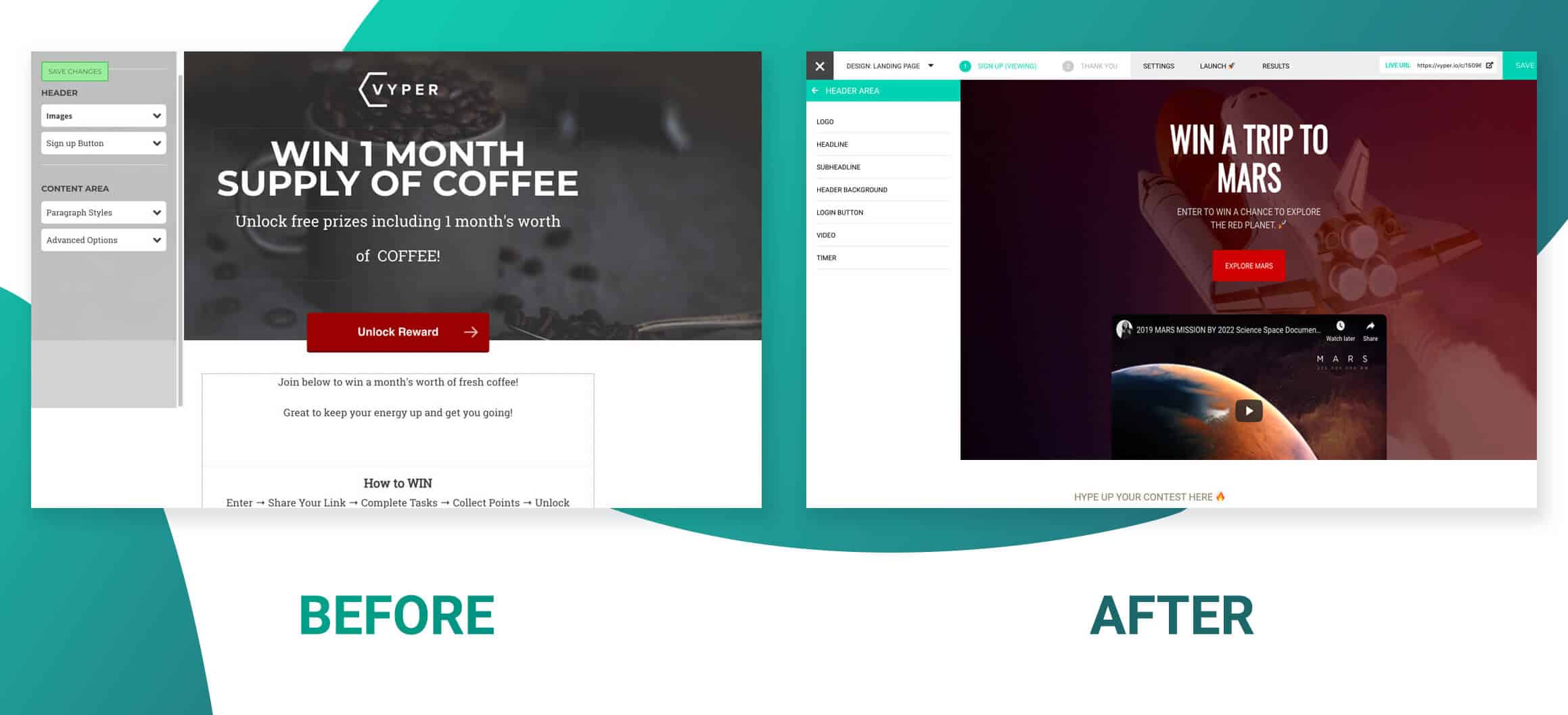
Vyper Contest Platform: Complete Buyer's Guide
Comprehensive AI-enhanced contest management solution
Vyper Contest Platform positions itself as a comprehensive AI-enhanced contest management solution that bridges the gap between traditional contest tools and cutting-edge automation. The platform targets marketing professionals seeking to eliminate operational inefficiencies while maintaining creative control over their campaigns.
Market Position & Maturity
Market Standing
Vyper maintains favorable positioning in the AI contest software market, particularly noted for its robust integration ecosystem and balanced approach to AI enhancement.
Company Maturity
The company's market maturity is evidenced by its diverse customer base spanning retail, e-commerce, and digital marketing agencies, with successful implementations across multiple industry verticals.
Growth Trajectory
Growth trajectory indicators include expanding customer adoption across multiple industry verticals and successful implementation patterns that demonstrate scalable business model execution.
Industry Recognition
Industry recognition includes acknowledgment from industry analysts for innovative AI contest management approaches, positioning Vyper as a mature solution for organizations seeking proven AI enhancement rather than experimental innovation.
Longevity Assessment
Long-term viability assessment is supported by the platform's integration-focused approach, which creates customer stickiness through workflow embedding rather than standalone tool adoption.
Proof of Capabilities
Customer Evidence
Retail brand success demonstrates Vyper's effectiveness in high-stakes marketing environments, with vendor-reported case studies highlighting a viral contest campaign that resulted in 50% increase in social media followers and 20% boost in sales during the contest period.
Quantified Outcomes
Performance metrics include 30% increase in contest participation rates, 25% reduction in fraudulent entries, and 20% reduction in manual processing time.
Case Study Analysis
Implementation success patterns show consistent results across diverse industries, with customers typically realizing AI transformation value within 4-6 weeks of deployment and full operational benefits after 3 months of consistent use.
Market Validation
Market validation is evidenced by successful implementations across multiple customer segments, from small marketing teams to enterprise organizations.
Competitive Wins
Competitive wins are demonstrated through customer adoption patterns where organizations choose Vyper over both traditional contest platforms and pure-play AI alternatives.
Reference Customers
Reference customer diversity spans retail, e-commerce, and digital marketing agencies, providing evidence of cross-industry applicability and flexible implementation approaches.
AI Technology
Vyper's AI architecture centers on predictive analytics engines, automated fraud detection systems, and real-time performance tracking capabilities.
Architecture
Integration architecture emphasizes comprehensive connectivity with existing marketing technology stacks, particularly CRM platforms like HubSpot and Mailchimp.
Primary Competitors
Primary competitors include traditional contest platforms like SweepWidget and emerging AI-first platforms like Uplup and ViralKit.
Competitive Advantages
Competitive advantages center on Vyper's balanced approach combining proven reliability with strategic AI enhancement.
Market Positioning
Market positioning occupies a strategic middle ground that appeals to organizations seeking AI benefits without abandoning established workflow patterns.
Win/Loss Scenarios
Win scenarios favor Vyper when organizations require proven stability with AI enhancement, comprehensive integration needs, scalable pricing that grows with usage, and dedicated support for complex implementations.
Key Features

Pros & Cons
Use Cases
Integrations
Pricing
Featured In Articles
Comprehensive analysis of AI Contest Tools for AI Marketing & Advertising for AI Marketing & Advertising professionals. Expert evaluation of features, pricing, and implementation.
How We Researched This Guide
About This Guide: This comprehensive analysis is based on extensive competitive intelligence and real-world implementation data from leading AI vendors. StayModern updates this guide quarterly to reflect market developments and vendor performance changes.
40+ verified sources per analysis including official documentation, customer reviews, analyst reports, and industry publications.
- • Vendor documentation & whitepapers
- • Customer testimonials & case studies
- • Third-party analyst assessments
- • Industry benchmarking reports
Standardized assessment framework across 8 key dimensions for objective comparison.
- • Technology capabilities & architecture
- • Market position & customer evidence
- • Implementation experience & support
- • Pricing value & competitive position
Research is refreshed every 90 days to capture market changes and new vendor capabilities.
- • New product releases & features
- • Market positioning changes
- • Customer feedback integration
- • Competitive landscape shifts
Every claim is source-linked with direct citations to original materials for verification.
- • Clickable citation links
- • Original source attribution
- • Date stamps for currency
- • Quality score validation
Analysis follows systematic research protocols with consistent evaluation frameworks.
- • Standardized assessment criteria
- • Multi-source verification process
- • Consistent evaluation methodology
- • Quality assurance protocols
Buyer-focused analysis with transparent methodology and factual accuracy commitment.
- • Objective comparative analysis
- • Transparent research methodology
- • Factual accuracy commitment
- • Continuous quality improvement
Quality Commitment: If you find any inaccuracies in our analysis on this page, please contact us at research@staymodern.ai. We're committed to maintaining the highest standards of research integrity and will investigate and correct any issues promptly.